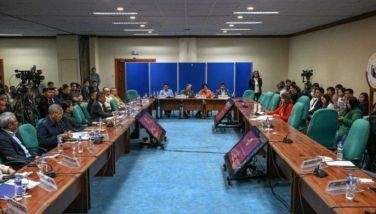'Phl water bug effective biological control for dengue'
MANILA, Philippines - A study conducted by a Filipino scientist found that the Philippine water bug could be an effective biological control for dengue-carrying mosquitoes.
Pio Javier of the University of the Philippines Los Baños’ College of Agriculture said the water bug was already proven to be an effective agent to prevent and control the disease based on a study conducted in India.
Javier conducted the research entitled “Water bug Diplonychus rusticus: A promising predator for Aedes aegypti (Dengue mosquito)” to evaluate the possibility of using water bug in controlling the population of dengue-carrying mosquitoes in the Philippines.
“But the water bug we are studying now is native and endemic in the Philippines. It is smaller compared to the Diplonychus indicus, the water bug studied in India,” he said.
The water bug species studied by Javier is found in the rice fields and is known as a voracious predator of aquatic insects including mosquitoes.
“The main advantage of the water bug compared to the other mosquito predators is its availability in many of the aquatic habitats, its tolerance to chlorination and its capability to reproduce easily,” Javier said.
Initial findings of the study revealed that a water bug can consume 86-99 full grown mosquito larvae per day. “Upon introduction of mosquito larvae to the water bug in a water container, the predator captures the larvae with its front legs in just a matter of seconds,” Javier said.
He said the water bug can be distributed in all mosquito habitats such as used tires, water containers, and other mosquito breeding sites.
“It can also be used to complement the OL (ovicidal/larvicidal) mosquito trap developed by the Department of Science and Technology (DOST),” Javier said.
“While the OL trap attracts female mosquitoes to lay their eggs, the water bug can feed on the hatched eggs. This prevents the occurrence of dengue-carrying mosquitoes,” said Javier.
“While the water bug shows potential to control the population of mosquitoes, a more detailed study on its biology, ecology and feeding behavior is very important,” Javier said.
The World Health Organization (WHO) also promotes the use of biological agents such as larvivorous fishes and predatory copepods like water bugs to control the population of dengue-carrying mosquitoes.
According to the WHO, two indigenous fish species were evaluated in India and found effective in controlling mosquitoes.
Gumbusia affinis, a fresh water fish species commonly known as gambusia or mosquito fish can consume about 100-300 mosquito larvae per day, while Poecilia reticulate, commonly known as guppy fish, can consume about 80 to 100 mosquito larvae per day.
These fish species are surface feeders and are able to consume both anophelines (malaria mosquitoes) and cullines (dengue-carrying mosquitoes).
They are resistant to water salinity, can easily multiply, withstand transportation and do not require specialized equipment or containers for survival.
“These fish species are now being used in India to eliminate mosquito larvae in wells, domestic water containers, concrete irrigation ditches, industrial tanks and cisterns,” according to Moh Seng Chang of the WHO.
“Larvivorous fishes and water bugs are environment friendly and are safe to use. It is also cheaper compared to chemicals used in controlling dengue-carrying mosquitoes,” Chang said.
- Latest
- Trending





























